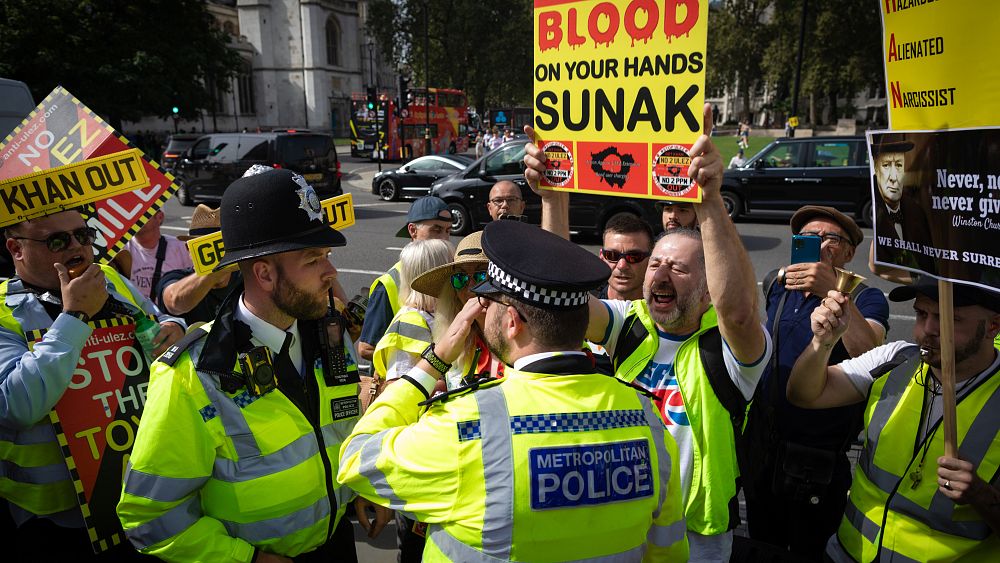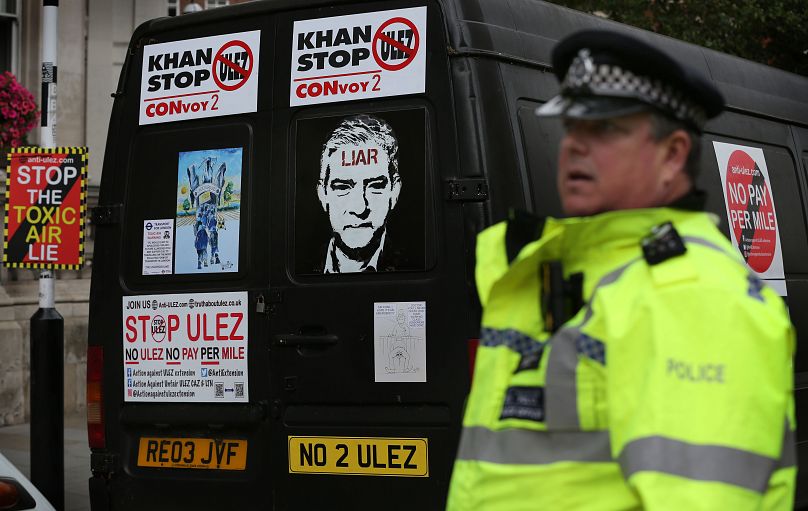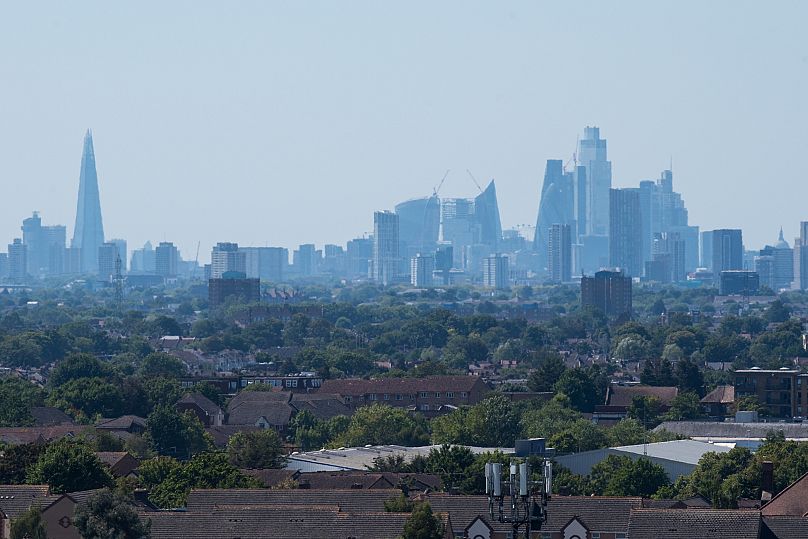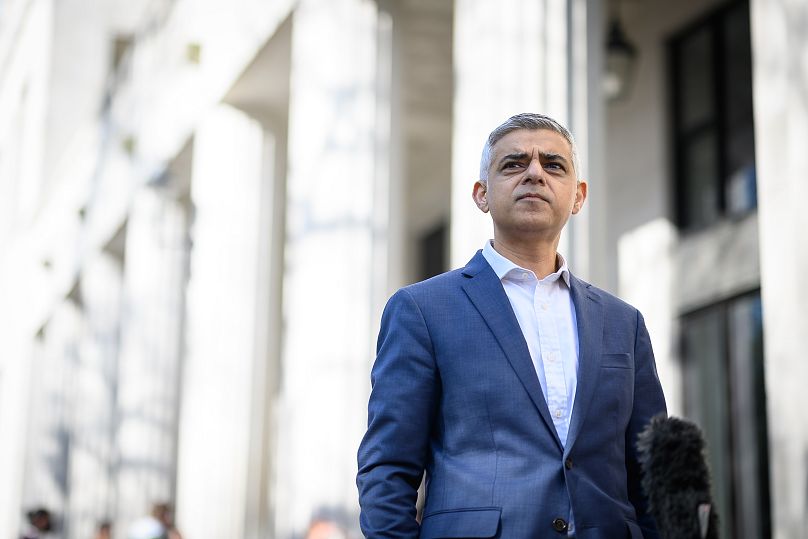
Earlier this week, a highly contentious scheme meant to curb congestion and pollution in inner London expanded to cover the city’s outer areas – and the sometimes extreme opposition to it continues to gather steam.
The ultra-low emission zone (ULEZ) scheme has been controversial from the off.
On the face of it, the scheme is an attempt by the London Mayor Sadiq Khan and his colleagues to clean up the air, ensuring better quality in the notoriously polluted city.
Drivers of petrol cars manufactured before 2006 and diesel vehicles made before 2015 already have to pay £12.50 (about €14.80) to drive within the newly-widened ULEZ zones for a day.
However, Transport for London (TfL) estimates that around 90% of vehicles currently on the road are compliant. TfL also says there is financial help available to those who are in possession of a non-compliant vehicle and cannot afford a new one.
Restricted to central London when it was introduced, the ULEZ had already been considerably expanded by 2021. As of this week, it now covers to the entirety of Greater London and its nine million-odd inhabitants.
Sadiq Khan has tried to reassure residents that it is for their benefit and not, as a growing number of people seem to believe, a restriction on their basic freedoms.

Detractors say it’s a way to control people’s movement and that its timing is disastrous, imposing new costs on drivers while the UK struggles through a major cost of living crisis.
The Conservative government have, almost unanimously, poured scorn onto the scheme, attacking Khan, a Labour mayor, for putting it in place. High profile right-wing commentators have also taken Khan to task.
However, many people – both in politics and outside of it – fail to realise (or choose to overlook) that the measure was, in fact, launched in 2015 by then-London mayor and future prime minister Boris Johnson.
There have been countless protests since ULEZ’s inception, with Londoners and outsiders alike marching on parliament, holding signs reading slogans like: “Khan = Liar” and “Khan must go”. Some have even called him a “dictator”, suggesting that the implementation is part of a sinister plot – supposedly connected to the increasingly popular concept of 15-minute cities – to turn London into a “net zero prison” with the introduction of “climate lockdowns”.
Lois Perry, director of CAR26 – an organisation which bills itself as ‘Climate Analysis Reason’ – told Euronews that “ULEZ seeks to change behaviour, away from personal freedom. It’s regressive as it hits those with older cars. It’s clearly a revenue grab and not even about clean air. It helps Khan sell his new book and boost his future ‘green’ career.
“It’s a tax on the poor but, more importantly, it’s an attempt to crush personal freedoms including freedom of movement.”
Perry also suggests that the move is nothing to do with improving air quality, and that Khan’s choice to “send motorists into the Underground where pollution levels are high” makes little sense if clean air is the aim of the scheme.

It is well-known that London’s air pollution problem is extremely severe. According to a 2022 report, air pollution in London was the cause of 1,700 hospitalisations in between 2017 and 2019.
Other research has found that toxic air has contributed to the premature deaths of thousands of Londoners in recent years.
In 2013, 9-year-old Ella Kissi-Debrah died after suffering through 25 emergency hospital admissions in the previous three years; in 2020, she was the first person in the world to have air pollution cited as a cause of death.
Yet, many anti-ULEZ protesters and campaigners strongly believe that London’s air is entirely clean – and that the scheme is simply a sign of corruption on the part of Sadiq Khan and his supporters.
While Greenpeace has welcomed the extension of the ULEZ, saying the city of London “can be proud” of the move, many grassroots critics are convinced it is an act of sheer cynicism.
One 64-year-old part-time bakery worker told AFP that he believes Khan is expanding the scheme “because he needs the money”.
“They don’t know how to manage their budget so they make us pay,” John Davis, a 66-year-old retiree told AFP. “They use pollution to take money from the poorest,” he says, even though, apparently, “pollution does not exist”.

It’s not just people outside of the political sphere who are furious with Khan.
Labour leader and supposed prime minister-in-waiting Keir Starmer criticised the Mayor over ULEZ after the their party narrowly failed to win a by-election in Johnson’s former seat of Uxbridge and South Ruislip, whose residents are now newly included in the zone.
Starmer asked Khan to “reflect” on his decision to extend the ULEZ, saying it had “without doubt” cost Labour the seat. The Conservatives’ margin of victory was a mere 495 votes.
Sitting Conservative Prime Minister Rishi Sunak and his government have widely denounced the ULEZ expansion, a real worry to environmental defenders ahead of next year’s general election.
Sadiq Khan is determined to press on, though, maintaining that the ULEZ project has a “proven track record” and the extension will allow “five million additional Londoners” to breathe “cleaner air”.
And with no u-turn in sight, a new wave of anti-ULEZ activisim is underway – some of it erring toward the extreme.
A new kind of ‘blade runner’
Among the many peaceful protests against the scheme, there have also been hundreds of cases of ULEZ cameras being vandalised, something that’s been ramping up since the extension came ever closer.
Styling themselves “Blade Runners” after the classic dystopian film, these activists have been tearing down, stealing or vandalising the cameras.
One of them, using the pseudonym Ben MacMillan, told The Daily Express newspaper that the attacks are unusual in that they aren’t undertaken by young people or by gangs of activists.
“It’s mostly people in their 40s and pensioners,” he told the paper. “I get old ladies asking me how to destroy the cameras. They’re going around London with garden shears. These are normal people who work normal jobs, have businesses, families.”
Despite the illegality of the acts, most of the so-called Blade Runners have managed to avoid being caught by authorities, with only a tiny number of charges brought so far.
At the beginning of September, it was estimated that around one in four ULEZ cameras had been damaged or removed – a statistic that shows the sheer scale of opposition to the scheme.
The vandalism has prompted Khan to roll out a fleet of enforcement vehicles to catch those flouting the rules.
Perhaps unsurprisingly, these teams have been targeted too, with the tyres of some vehicles deflated.
Lois Perry is one of many critics of the scheme who maintains that the environment is not suffering.
She, like many others, do agree that the actions of the Blade Runners are a little extreme.
“Protestors who damage property are going a step too far. It sets a bad precedent. We’d be more sympathetic to people putting bags over cameras”, she tells Euronews.
Other solutions put forward are “signing petitions, demonstrations, supporting campaigners, writing to MPs and voting”. But by whatever means, the war on ULEZ seems certain to rage on.



